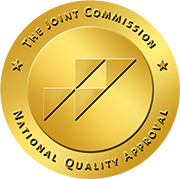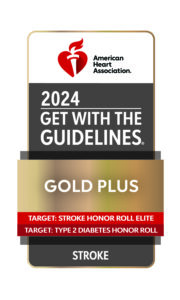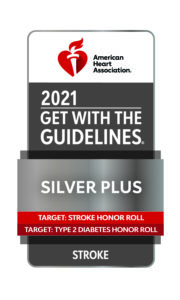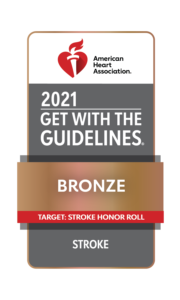Primary Stroke Center
This prestigious advanced certification from The Joint Commission demonstrates the hospital’s expertise and commitment to the community in quickly treating stroke patients and providing the highest level of quality treatment and services according to national standards.
Northern Regional has earned Get With The Guidelines-Stroke Gold Plus, Silver Plus and Bronze Achievement Awards for commitment to prioritizing quality care for stroke patients.





What is a Stroke?
Stroke is the leading cause of long-term disability and the fifth leading cause of death in the United States, with approximately 795,000 strokes occurring each year. About 610,000 of these are first or new strokes. On average, someone in the U.S. has a stroke about every 40 seconds and every 4 minutes, someone dies from stroke. Early diagnosis and treatment is crucial when someone experiences a stroke.
A stroke, is sometimes called a “brain attack”. Brain cells need a constant supply of blood and oxygen. When that supply is cut off those cells stop working. Without the blood and oxygen they need, the effected brain cells begin to die. These dead cells never grow back and abilities controlled by that area of the brain such as memory, speech, and muscle control are lost.
Sometimes you can have a “mini stroke” or TIA (transient ischemic attack). A “mini stroke” occurs when a blood clot blocks an artery in the brain for a short time. Sometimes a stroke is preceded by a TIA. It is extremely important to seek medical attention just as emergently so that a complete evaluation can be done to try and prevent a stroke from occurring.
Risk Factors
Anyone can have a stroke. Many common medical conditions can increase your chances. You may not be able to prevent a stroke, but there are things you can do to reduce your risk. Work with your health care team to learn what changes you need to make and what treatment is best for you.
Here are some important things you can do:
- Stop smoking, it significantly increases the risk of heart disease and stroke
- Get plenty of exercise
- Limit alcohol intake to no more than 1 drink a day for women or 2 drinks a day for men.
- Lose weight or maintain a healthy weight. Too much fat, especially around your waist, increases the risk for heart disease and stroke. Check your BMI on a regular basis
- Eat a heart healthy diet with a variety of fruits and vegetables, whole grains, low-fat dairy products, skinless poultry and fish, nuts and legumes, and non-tropical vegetable oils
- If you are diabetic, protect your health by managing your blood glucose, or blood sugar and maintain regular office visits with your physician
- If you have high blood pressure or high cholesterol work closely with your doctor to manage your medications and make lifestyle changes to optimize your health
Warning Signs of a Stroke
- Sudden numbness or weakness of the face, arm or leg, especially on one side of the body
- Sudden confusion, trouble speaking or understanding
- Sudden trouble seeing in one or both eyes
- Sudden trouble walking, dizziness, loss of balance or coordination
- Sudden severe headache with no known cause
Never ignore warning signs of a stroke. Stroke is ALWAYS an emergency so ALWAYS call 911. Time is Crucial.
Why is Time So Important?
If you are having a stroke, it is critical to get medical attention as quickly as possible. The physician must first determine if the stroke is Ischemic, caused by a clot blocking the artery (which occurs in approximately 85% of all strokes) or a Hemorrhagic stroke that involves bleeding into the brain.
The treatment for an Ischemic Stroke is to quickly restore blood flow to the brain. Some people can benefit from a medication called Alteplase with restores blood flow by dissolving the blood clot that is causing the stroke. This drug must be given within 4.5 hours after the stroke symptoms first begin. Your physician will consider certain risks to determine if Alteplase is appropriate for your condition.
Stroke treatments must begin as soon as possible to achieve the best possible outcome. Time is Brain! Our medical team at Northern Regional Hospital stands ready to rapidly provide you with the highest quality of care to ensure the best possible outcome for you or your loved one in the event of Stroke.




